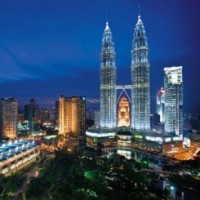2012 was a mix of both the exciting and the mundane; 2013 looks to be much more of the same.
2012 was both a relatively calm and stable year across the globe – aside from sporadic but intense violence in parts of the Middle East and Africa, war was largely unheard-of – and one that continued to put paid to everything observers have understood about the international order for two decades.
The European Union faces obstacles it either cannot or will not overcome, with a fundamental disparity between the northern Member States and the southern ones over government finances, austerity, wealth, industry, taxation, government service, pensions and employment that make an further integration of the Member States a dream potentially forever delayed.
The United States’s political gridlock is so severe that there is an increasingly high likelihood that the government will default on its debt, and the resolution of the so-called ‘fiscal cliff’ – a combination of tax hikes and spending cuts set to take effect today – is almost irrelevant against the climbing deficit and debt figures and a growing and barely-managed welfare state.
Even China, the economic dynamo since the rest of the world tipped into recession in 2008, has enormous problems all its own. Its export-based economy finally began to slow in 2012, and its recovery – almost entirely the result of Japan-style government-sponsored infrastructure projects – began in October but already appears to be losing steam.
2012 may have spelt either an end to the existing regime, or at least a pause, but it also heralded another change: the rise of Asean, with Malaysia at the forefront.
It is not an exaggeration to describe 2012 as the year that the world’s focus began to truly look to Southeast Asia, and for that Malaysia and Prime Minister Datuk Seri Najib Razak deserve no small amount of credit.
Najib’s engaged, respectful approach to Myanmar helped the country emerge from decades of isolation and into a fledgling democracy – an approach that proved far superior to China’s attempts to dominate the country and the West’s attempts to isolate it. The conflict between the Moro Islamic Liberation Front and the Philippines came to a quiet and hopeful conclusion as Najib’s mediation of that conflict bore fruit. The US, concerned by increasingly assertive claims by Beijing to much of the region, re-doubled its co-operation with friendly Asean nations, hoping to create a peaceful counterweight to Beijing’s rhetoric.
Yet it was not only the absence of conflict, but the presence of growing economic power and trade, that made the Association of Southeast Asian Nations a focal point for the world, led by Malaysia’s “gravity-defying” growth.
What makes that growth so remarkable is not only its strength relative to the world’s (where Malaysia’s 5 per cent GDP growth is the envy of most of the world), nor relative to the region (few other Asean nations came close), but the fundamentals on which it rests. There are very real signs that Malaysia has escaped the ‘middle-income trap’, whereby a country skyrockets out of poverty on the strength of its export base, but is never able to generate sufficient internal economic growth that its own population can support a domestic economy.
That conundrum has been both one of Najib’s foremost concerns as Prime Minister and one of his least-appreciated successes. Malaysia’s economic growth in the face of declining demand from the major economic centres of the US, EU and China is driven not merely, as Pakatan Rakyat insist, by government spending, but by real domestic demand.
If this pattern holds – and all of the data suggest that it will through 2013 at least – then it appears very likely that Vision 2020 will come to pass on schedule. That, in turn, will feed foreign direct investment and trading opportunities as the world continues to focus on Malaysia and the region, creating what is known as a ‘virtuous cycle’.
Najib postulates – as part of his Global Movement of Moderates – that trade brings peoples together. 2012 suggested that was true. At the current pace of events, it appears that 2013 may very well prove it.

